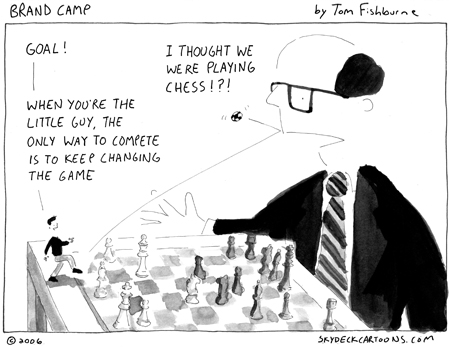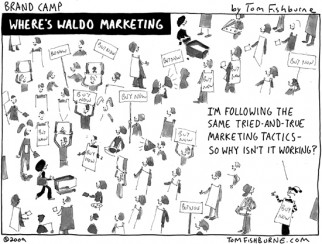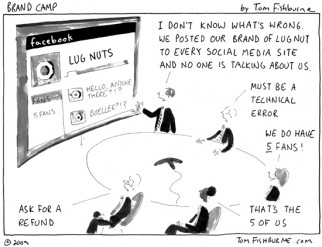I gave a talk last week on challenger brand thinking, so I’ve had David and Goliath on my mind. I talked about the importance of changing the game when you’re the little guy so that you’re not playing by the rules of Goliath. Changing the game can level the playing field.
Last month, I read a fascinating article from Malcolm Gladwell on “How David Beats Goliath“. Malcolm researched classic David versus Goliath match-ups in history and confirmed statistically that David triumphs over Goliath much more frequently when they change the game.
“In the Biblical story of David and Goliath, David initially put on a coat of mail and a brass helmet and girded himself with a sword: he prepared to wage a conventional battle of swords against Goliath. But then he stopped. “I cannot walk in these, for I am unused to it,” he said, and picked up those five smooth stones. When underdogs choose not to play by Goliath’s rules, they win, ‘even when everything we think we know about power says they shouldn’t.'”
It reminded me of something that Eric always says at method: “you can’t out-Clorox Clorox.” This is essential in remaining a challenger brand. Method can’t start to follow the same playbook as big brands or it loses exactly what put method on the map in the first place.
In “Eating the Big Fish“, Adam Morgan calls this challenger brand archetype the “Scrappy David”. But, as Scrappy David starts to grow up, there is pressure to start playing more conventional rules. Scrappy behavior can be inefficient and messy after all. It is certainly important to become more professional. But it is also important not to confuse growing up with imitating Goliath. It is important not to give up the slingshot and pick up the sword, even as you become more professional in your attack. From Malcolm’s article:
“When an underdog fought like David, he usually won. But most of the time underdogs didn’t fight like David. Of the two hundred and two lopsided conflicts in Arreguín-Toft’s database, the underdog chose to go toe to toe with Goliath the conventional way a hundred and fifty-two times—and lost a hundred and nineteen times … when the world has to play on Goliath’s terms, Goliath wins.”
I think this “Goliath Envy” creates a real tension for small challenger brands that are maturing. Adam Morgan argues that challenger brands frequently evolve from the Scrappy David to eleven other challenger brand archetypes: The People’s Champion (Virgin Atlantic), the Real and Human Challenger (Ben & Jerry’s), the Missionary (JetBlue), etc. Adam actually puts method in The Visionary camp (not the Scrappy David), because it “sets out higher vision that transcends category nature.”
These challenger brand archetypes offer guideposts on how to evolve your brand over time. But the key, I think, is not to evolve into Goliath itself (even if you are Goliath). I actually think that any brand (large or small) has the capability to think of itself as a challenger brand and find ways to break the conventional rules of doing things (finding your inner David). There is opportunity for any brand to change the rules.
But, when you’re an underdog, it’s absolutely essential.




Leave a Reply